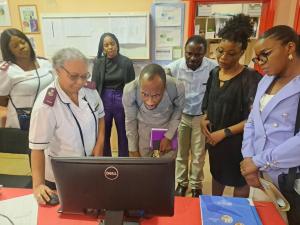Namibia is striving to improve quality of care for maternal and child health
Namibia was one of the countries in the WHO Africa Region (AFRO) to conduct an assessment on the quality of care for maternal and child health in health facilities. WHO’s vision for quality of care is for every pregnant woman and newborn to receive quality of care throughout pregnancy, childbirth, and the postnatal period. The assessment that was conducted in March 2024 was supported by AFRO and aimed to determine the approaches countries employ and document lessons on institutionalizing quality of care for pregnant women and their newborns.
Namibia has made progress in the reduction of the Maternal Mortality Rate starting at 450 in the year 2000 to 215 per every 100,000 deliveries in 2020. However, much is required to meet the 2030 target of at least 70 deaths per 100000 deliveries.
In pursuit of improving the quality of maternal and child health, the World Health Organization (WHO) spearheaded the Quality of Care (QoC) Network in 2017 to reduce maternal, stillbirths, and newborn deaths by 50% by the end of the five years and improve the experience of care for mothers and newborns by 2022. The network consisted of 10 countries (i.e., Bangladesh, Côte d’Ivoire, Ethiopia, Ghana, India, Malawi, Nigeria, Sierra Leone, Uganda and the United Republic of Tanzania). The QoC initiative was implemented in ten countries from 2017-2022/2023. In 2023, WHO commenced a review of the countries to profile the gains of the network. Although Namibia was not part of the network countries, with the support of its development partners, Namibia engaged in several initiatives towards improving quality of care. During this review by WHO, Namibia was selected for profiling its QoC in reproductive, maternal and child health.
The assessment was conducted at selected health facilities and health districts in the Erongo and Khomas regions. Dr. Apollo Basenero, Chief Medical Officer of Quality Management (QM) programme in the ministry of health and social services during an in-depth interview noted that “In 2021, the MoHSS developed and launched the Hospital Quality Standards with the support of partners such as the WHO and Center for Diseases Control (CDC). The aim was to identify gaps in the functions, initiate continuous improvement interventions, and to reach accreditation by the end of 2024” reported Dr. Basenero.
The development and implementation of HQS is leveraging hospitals in quality improvement across sectors including maternal and child health. The presence of a very robust governance structure regarding Quality Assurance and improvement is clear across the levels of service provision including at the national level, where there is a set division that directly reports to the executive director.
Various quality improvement collaboratives are underway, contributing to improved quality of care in maternal and child health. “It is encouraging to know that the work Namibia is doing in improving quality of care is being acknowledged, our work being reviewed in this WHO assessment allows another eye to look at our work and pushes us to keep improving,” remarked Mrs. Esperanca van Der Merve the national officer for safe motherhood and newborn care with the MoHSS.
The Quality-of-Care journey in Namibia showcases a strong track record of demonstrating sustainability. The HIV Quality (HIVQual) initiative started in 2007 and has since grown to encompass a comprehensive Quality Assurance department that expanded beyond HIV care including for maternal health. MoHSS and its partners including the WHO, are making financial and technical investments towards scaling up and institutionalization of quality improvement through training, material development, learning sessions and payment of salaries of key officers of the QA division.
The review of Quality of Care in Namibia was successfully completed, and the findings included multiple strengths and some threats to quality care. The review indicated that Namibia has a solid history of demonstrating sustainability in the development and implementation of hospital and PHC quality standards, a robust governance structure, as well as the commitment of development partners in implementing various quality improvement collaboratives. However, the gains are threatened by a lack of structured exit strategies at the end of quality improvement collaboratives, high attrition rate of trained staff and inadequate sustainable financing for quality improvement activities.
